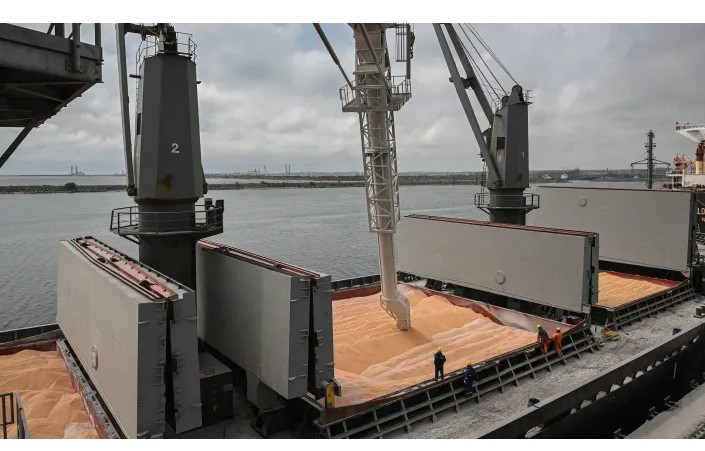Freeing of Ukrainian grain from the russian blockade will be difficult and dangerous – Ursula von der Leyen
Kuleba calls on not to buy stolen Ukrainian grain

Fear of the global food crisis is growing as russia's blockade of Ukrainian seaports and attacks on Ukrainian grain warehouses close one of the world's biggest granaries. There are growing fears that president putin will use grain as a new powerful weapon in his war, writes The New York Times.
World leaders have called for international action to deliver 20 million tonnes of grain blocked in Ukraine. Some have warned that unless the port of Odessa is opened soon, there will be a danger of famine in some countries and political unrest in others, which could be the most serious global consequence of russia's attack on the neighboring country.
Ursula von der Leyen, the president of the European Commission, accused russian troops of confiscating Ukrainian stocks of grain and agricultural machinery, russian artillery of bombing grain depots, and russian warships in the Black Sea of seizing Ukrainian cargo ships loaded with wheat and sunflower seeds.
“In addition, russia is currently accumulating its own food exports as a form of blackmail, holding supplies to raise world prices or trading wheat in exchange for political support,” von der Leyen said in her speech in Davos.
According to her, the European Union is working to open alternative routes for land transport, which connect Ukraine's borders with European ports. But due to the fact that the West does not want to provoke a direct military confrontation with russia, and the global food logistics network has not yet recovered from pandemic-related supply disruptions, freeing Ukrainian food exports will be difficult and dangerous.
Among the proposals being discussed is a proposal from a Lithuanian official that a flotilla escorted by vessels from non-NATO countries to break the russian blockade of Odesa and escort Ukrainian cargo ships. Countries that suffered the most from the food shortages, such as Egypt, will provide escort ships.
At the World Economic Forum, where fears about the consequences of the war have outweighed all other global issues, political leaders and food security experts estimate the impending crisis as a very dangerous one.
“It's the perfect storm within the perfect storm,” said David Beasley, executive director of the World Food Program and the United Nations. “Unless the Odesa port is opened, it will accentuate our problems.”
Calling the situation “absolutely critical”, he warned: “Famine will affect the whole world.”
On the background of the global food crisis provoked by russia's blockade of Ukrainian grain, Ukrainian Foreign Minister Dmytro Kuleba on Tuesday accused “russian thieves” of stealing Ukrainian grain.
“russian thieves steal Ukrainian grain, load it onto ships, pass through Bosporus, and try to sell it abroad,” he wrote on his Twitter page. “Don’t buy the stolen. Don’t become accomplices to russian crimes. Theft has never brought anyone luck.”
If you have read this article to the end, we hope that means it was useful for you.
We work to ensure that our journalistic and analytical work is of high quality, and we strive to perform it as competently as possible. This also requires financial independence. Support us for only UAH 196 per month.
Become a Mind subscriber for just USD 5 per month and support the development of independent business journalism!
You can unsubscribe at any time in your LIQPAY account or by sending us an email: [email protected]



